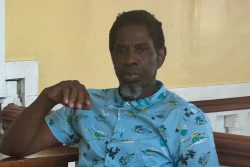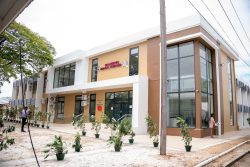On June 13, 1980, outside the Georgetown Prison, a walkie-talkie in the lap of Dr Walter Rodney exploded, killing him. He had been sitting in the passenger seat of a stationary car, and next to him in the driver’s seat was his brother, Donald Rodney. In 1982 Mr Donald Rodney was charged and convicted of unlawful possession of explosives and sentenced to eighteen months imprisonment. He subsequently appealed that conviction and sentence within the specified statutory period and was given bail.
On Tuesday of this week the Court of Appeal set aside Mr Rodney’s 1982 conviction and sentence. This is after a lapse of almost forty years, and refers back to a time when most of the citizens of this country would not even have been born yet, or if they had, would be too young to remember the events of 1980 or the court case which followed it. If they read the recent story about the court decision or watched it on the news, they might have wondered what it was all about, and at the very least might have been perplexed by the fact that it took nearly four decades for the appeal to be heard. Even in Guyana with its notoriously sluggish judicial system this level of delay is exceptional.
But this is a case which belongs to another era. It constitutes, in a sense, a coda to the events of 1980, which even today have not been fully elucidated. For the years when the PNC was in power up to 1992 all kinds of forgery and deceit were brought into play to ensure that Mr Rodney could not win his appeal. His statements in his defence at trial, for example, were removed from the records of the court, which were then falsified to make it appear as if he had admitted his guilt. These documentary disappearances also encompassed the statements he had made to the police, despite the fact that these had been widely circulated, not just locally but internationally as well.
The most flagrant miscarriage of justice in this matter, however, occurred when completely unknown to Mr Rodney, his appeal was filed to the Full Court of the High Court which then dismissed it. He had left the country to seek political asylum and did not hear about the ‘appeal’ until very much later. This was the first hurdle he had to negotiate in relation to the judicial system if he wanted to clear his name.
Finally, at an Appeal Court hearing in 2019 Mr Rodney testified that at no time had he filed an appeal with the Full Court. He argued that the Full Court division of the High Court did not have the jurisdiction to hear such an appeal in the first place, let alone pronounce on it, and the court as well as the state counsel agreed with him. As a consequence the Full Court ruling was set aside and a date was finally fixed to hear Mr Rodney’s appeal, which began on March 26 before Chancellor (ag) Yonette Cummings-Edwards, and Justices of Appeal Dawn Gregory and Rishi Persaud.
In the hearings Mr Rodney’s lawyer, Mr Sanjeev Datadin, argued that during the criminal trial the prosecution had not established a case for his client to answer, and had even failed to prove he was in possession of an explosive device. Among other things it had called no witness to testify to that effect. Director of Public Prosecutions Shalimar Ali-Hack agreed that no evidence had been led at trial to show that the walkie-talkie or any of its components was an explosive. That notwithstanding she considered that the charge against Mr Rodney had been validly instituted.
In addition to setting aside Mr Rodney’s conviction, the Appeal Court also ruled that his constitutional rights had been breached in view of the nearly 40 years it had taken for the appeal to be heard. The DPP too acknowledged the violation of constitutional rights involved, given the great length of time the matter had spent in the justice system, and in a statement following the ruling said the court’s decision was in keeping with the law.
There must be a great sense of relief for Mr Rodney after having waited so many years. He was given a pardon by former President Donald Ramotar in 2014, the same year that a Commission of Inquiry was set up to investigate the circumstances surrounding the death of Dr Walter Rodney. However, Mr Datadin’s view was reported to be that the pardon could apply to the sentence but not the conviction. Be that as it may, in the popular mind a pardon equates to state forgiveness for a crime committed, but does not have the same sanitising effect as a court judgment setting aside a wrongful conviction. Neither does it give official recognition to the serious contravention of Mr Rodney’s constitutional rights which a court can do.
Mr Rodney’s travails would normally be expected to mark the end of the saga relating to the assassination of his brother, except that as mentioned earlier the full story pertaining to that event has still not been revealed. No doubt further information in connection with it may yet emerge. The CoI which had been tasked with looking into the killing sat for many months and had not heard all the witnesses when it was discharged by former President David Granger who had just acceded to office. That premature discharge notwithstanding, the Commission concluded that Dr Rodney had been the victim of a state-organised assassination which would only have been possible with the knowledge of then Prime Minister Forbes Burnham.
If the public still awaits a comprehensive account of how Guyana’s leading political activist and foremost historian came to be killed, at least the situation in respect of his brother is now resolved and he can go back to being an ordinary citizen, as he described it, and not have the designation of convict hanging over him. It is an outcome which is not just good for him, but also for the justice system and by extension, the country as a whole in so far as it represents a belated victory for the rule of law.








